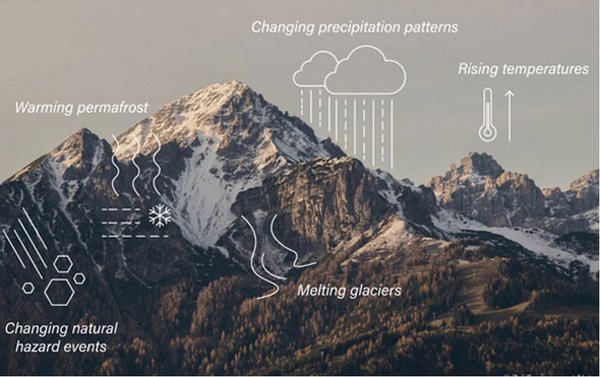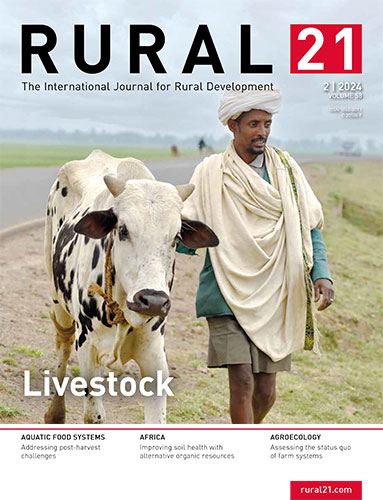 Read this article in French
Read this article in French- Share this article
- Subscribe to our newsletter
Strengthening the resilience of mountain regions to climate change
As an Alpine nation with an outstanding research environment, Switzerland is well positioned to assist other mountain regions in adapting to climate change.
Four regions, one goal
In 2019, the Swiss Development Cooperation (SDC) initiated the supraregional “Adaptation@Altitude” project, bringing together numerous global, regional and local implementation and research partners. Across four mountainous regions – East Africa, the Andes, the South Caucasus and the Hindu Kush–Himalayas – it supports efforts to develop systemic approaches to enhance the resilience of populations and environments to the adverse effects of climate change. Through more sustainable natural resource utilisation and preventative disaster risk reduction measures, these regions should be able to better mitigate climate change impacts.
Experience from other climate initiatives demonstrates that regional adaptation strategies are particularly effective because communities within a region face similar challenges and often share cross-border resources like water or pasturelands. At the same time, an exchange of knowledge between the different mountain regions makes it possible to discuss difficulties and models for success, to learn from each other, and to speak with one voice in international processes.
The expertise of Swiss universities and the prioritised use of digital technologies – a key focus of the IC Strategy 2021–24 – make crucial contributions to accurately measuring and scientifically analysing climate change. To tackle these varied entry points and spheres of action, the project consists of four complementary components.
Component 1: Sound data as a prerequisite for informed actions
As climate change manifests itself differently across ecosystems, adaptation strategies must be tailored to local conditions. Closing knowledge gaps about climate change's impacts on mountain regions with sound data is therefore crucial. The Mountain Research Initiative, a scientific network involving Switzerland’s University of Bern, contributes to this endeavour by providing access to data from monitoring stations in the four project regions via a portal.
Component 2: Strengthening the dialogue between science, practice and politics
Ensuring that the voices of mountain communities are heard in planning processes is crucial. However, this has often been overlooked, as their representatives face barriers in accessing decision-making spheres due to geographic isolation and socioeconomic challenges like poverty.
As part of the project, channels of exchange with policy-makers were initiated or strengthened at regional and national levels. This made it possible to incorporate issues relevant to mountain regions in national action plans.
Component 3: Dissemination of scientifically proven adaptation strategies
People working in agriculture experience climate change daily and possess extensive practical knowledge on adapting to weather and climatic conditions. By systematically collecting, analysing and disseminating this knowledge, other communities and regions can benefit from these insights.
In partnership with the University of Geneva, a global database named the “Solutions Portal” has been created for this purpose. Currently, the platform has over 100 entries. In certain regions like the Andes since 2022, “communities of practice” have emerged with support from international organisations such as the United Nations Environment Programme.
Component 4: Anchoring the needs of mountain regions in global climate forums
The core tenets of climate policy are established at UN climate negotiations, which are informed, among other factors, by the scientific analyses of the highly influential Intergovernmental Panel on Climate Change (IPCC). However, the specific needs of mountain regions have thus far not received the attention they warrant in global dialogues, given their importance for the world's fresh water supply and biodiversity.
The wealth of solid data gathered via this project has contributed to exposing these blind spots within climate discourse.
Future priorities of the project
An external evaluation in 2023 confirmed the coherent interplay of “Adaptation@Altitude”’s four components. There are effective and internationally visible initiatives to strengthen the resilience of mountain regions against climate change. A pivotal factor contributing to the project's success is the broad-based support at local, regional and international levels.
Given its ever-increasing relevance amid accelerating climate change, the project will continue under the new IC Strategy 2025–28. The second phase (2024–27) is to prioritise the following areas:
- Consolidation of established knowledge-sharing mechanisms, such as the “communities of practice”
- Scientific assessment of adaptation strategies' effectiveness and analysis of approaches for their systematic, long-term implementation in practice
- Pursuit of long-term financing solutions to ensure the project's financial sustainability beyond the SDC's support
(SDC/wi)
More information:
Video: "Adaptation at Altitude - Taking Action in the Mountains"(Zoï Environment Network, 2024)





Add a comment
Be the First to Comment